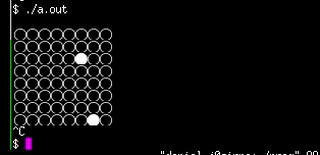

urlopener re-written in C
8/3/2019
For the longest time I was using a urlopener script I had written in Python. I pipe links from my terminal into dmenu, then into my urlopener. The urlopener launches certain programs depending on the domain and file extensions. I recently thought it'd be fun to rewrite it in C. It was fun.
The source code can be found in my git repo.


Terrible, hacky database syncing
30/1/2019
Someone in my family wanted a custom inventory system made that was accessible from any device and had some features they couldn't find in any pre-made solution so I made my own. It works great (code not distributed, if you want it ask, GPL3), however prior to creating it they never mentioned wanting to view it away from their LAN. So I had to come up with a solution.
The server that the website (it's PHP/mysql) is located on has no access to external servers, so I had to route everything through my own computer.
My solution was cronjobs, sqldumps and sftp. Perfectly hacky.
Every hour (*/59 * * * *, each computer has a different localtime, so there isn't any concerns there) the server hosting the website creates an sql dump of the database and backups the uploaded images, my local computer then pulls that dump and backup and uploads the sql dump to my external server, which then imports it.
The images are not uploaded to the external server, but this is fine, the user indicated they only need access to the textual data off-site. It would be just too much data otherwise.
I also created a cut-down viewer for the data removing the ability to view images, add, edit and delete items.
sql dump and images backup:
name=$(date +"%d-%b-%Y-%H-%M") mysqldump -u inventory -ppasswordhere inventory > /home/user/inventory.sql tar -zcvf /webuser/backups/inventory_directory.tar.gz /var/www/html/inventory cp /webuser/backups/inventory_directory.tar.gz /home/user/inventory_directory.tar.gzdownloading and uploading the backups and sql dump:
sftp user@tewi:/home/user <<EOF get /home/user/inventory.sql /home/daniel_j/programming/inventory.sql get /home/user/inventory_directory.tar.gz /home/daniel_j/programming/inventory_directory.tar.gz exit EOF sftp -oPort=port user@danieljon.es:/home/user <<EOF put /home/daniel_j/programming/inventory.sql exit EOFImporting the database:
mysql -u inventory -ppasswordhere inventory < /home/user/inventory.sql


listen.moe song history
10/1/2019
I had someone who listens to listen.moe complain that they had heard a song they liked but couldn't get the name of because they were driving. The website only gives you the last 3 songs played so I used their API to parse their song list and display every one that was played on a particular day in order. They found the song, and it sure is great.
getsongs.py
#!/usr/bin/python2.7
import json
import urllib2
import codecs
def request(url, header, jsonpayload):
baseurl = "https://listen.moe/api/{}";
req = urllib2.Request(baseurl.format(url));
req.add_header("Content-Type", "application/json");
req.add_header("Accept", "application/vnd.listen.v4+json");
if header is not None:
req.add_header(header[0], header[1]);
response = urllib2.urlopen(req, json.dumps(jsonpayload) if jsonpayload is not None else None);
return response;
loginpayload = {
"username": "name",
"password": "password"
}
def main():
# login and get response with our token
response = request("login", None, loginpayload);
# extract token
token = json.loads(response.read());
token = token["token"];
# request songs list
response = request("songs", ["Authorization", "Bearer " + token], None);
response = json.loads(response.read());
# dump song list to file
with codecs.open("songs.json", 'w', encoding="utf-8") as f:
json.dump(response, f, indent=2, sort_keys=True, ensure_ascii=False);
exit();
if __name__ == "__main__":
main();
parse.py
#!/usr/bin/python2.7
import json
date = "2019-01-09";
songs = [];
def main():
infile = "songs.json";
with open(infile) as f:
data = json.load(f)
for song in data["songs"]:
if date in song["lastPlayed"]:
songs.append(song);
# sort songs by timestamp
songs.sort(key=lambda x:x["lastPlayed"]);
for song in songs:
print("{} last played {}".format(song["title"].encode("utf-8"), song["lastPlayed"]));
if __name__ == "__main__":
main();


A simple binary counter and LED matrix
20/12/2018

Using this same technique I emulated an 8x8 LED matrix and created a bouncing ball demo. The code can be found in my git repo.

#include <stdio.h>
#include <unistd.h>
// website generator breaks with unicode, so fill in the unicode characters yourself
#define CIRCLE "CIRCLE"
#define BLACKCIRCLE "BLACKCIRCLE"
void
printleds(unsigned char value)
{
printf("\0337");
printf("%s", "\033[1;0F");
printf("%s", "\033[0J");
printf("%s\t%s\t%s\t%s\t%s\t%s\t%s\t%s\n",
(value & 1 << 7) ? BLACKCIRCLE : CIRCLE,
(value & 1 << 6) ? BLACKCIRCLE : CIRCLE,
(value & 1 << 5) ? BLACKCIRCLE : CIRCLE,
(value & 1 << 4) ? BLACKCIRCLE : CIRCLE,
(value & 1 << 3) ? BLACKCIRCLE : CIRCLE,
(value & 1 << 2) ? BLACKCIRCLE : CIRCLE,
(value & 1 << 1) ? BLACKCIRCLE : CIRCLE,
(value & 1 << 0) ? BLACKCIRCLE : CIRCLE
);
printf("\0338");
}
int
main(void)
{
unsigned char value = 0;
while (1)
{
printleds(value);
value++;
if (value >= 255)
value = 0;
sleep(1);
}
return 0;
}


Switched to dash as my shell
3/12/2018
For a number of weeks now I have been using dash as my shell, replacing bash.
I have been taking tab-completion and the command history for granted and felt it appropriate to lose those luxuries.
I have also left PS1 as default, meaning 'pwd' has become a close friend.
I also re-linked /bin/sh to point to dash, meaning I had to remove all the bash-isms from my various scripts which was a fun process.
Glob patterns have replaced tab completion and carefully thinking about what I am typing removes the need for the command history and arrow-key navigation (which isn't a thing in dash, meaning you can't go back to add or change a character).
I have no intentions on switching shells back to bash, I like this kind of punishment.


Raspberry Pi 4 digit 7 segment display effects
27/11/2018
After the last post I began playing with a real 7 segment display with 4 digits using the Pi. My goal was to create text effects without using libraries.
displayword(unsigned char str[4]) // simply display a word, use in a loop blinkword(unsigned char str[4], int repeat) // blink word once plus any integer > 0. < 0 will blink forever runclock(void) // display the time on the display, forever scrollword(char *string) // scroll the string from right to left with a small buffer of extra charactersScrolling text:
Blinking text:
The source code can be found here.


7 segment display
11/11/2018
The gif recreated using this program:
The code for this version can be found here.
---
#include <stdio.h>
/*
A
_
F| |B
G -
E| |C
-
D
A 7 segment display (unsurprisingly) has 7 individual segments that can conveniently make 0-9 and A-F
perfect for hexadecimal.
The state of a single 7 segment character can also conveniently be stored in 8 bits (a byte, in C a char),
almost as if these aren't coincidences (they're not).
*/
enum segments
{
/* refer to the diagram to know which value represents which segment */
SEG_A = 1 << 0,
SEG_B = 1 << 1,
SEG_C = 1 << 2,
SEG_D = 1 << 3,
SEG_E = 1 << 4,
SEG_F = 1 << 5,
SEG_G = 1 << 6,
};
enum characters
{
CHAR_ZERO = SEG_A | SEG_B | SEG_C | SEG_D | SEG_E | SEG_F,
CHAR_ONE = SEG_B | SEG_C,
CHAR_TWO = SEG_A | SEG_B | SEG_D | SEG_E | SEG_G,
CHAR_THREE = SEG_A | SEG_B | SEG_C | SEG_D | SEG_G,
CHAR_FOUR = SEG_B | SEG_C | SEG_F | SEG_G,
CHAR_FIVE = SEG_A | SEG_C | SEG_D | SEG_F | SEG_G,
CHAR_SIX = SEG_A | SEG_C | SEG_D | SEG_E | SEG_F | SEG_G,
CHAR_SEVEN = SEG_A | SEG_B | SEG_C,
CHAR_EIGHT = SEG_A | SEG_B | SEG_C | SEG_D | SEG_E | SEG_F | SEG_G,
CHAR_NINE = SEG_A | SEG_B | SEG_C | SEG_D | SEG_F | SEG_G,
CHAR_A = SEG_A | SEG_B | SEG_C | SEG_E | SEG_F | SEG_G,
CHAR_B = SEG_C | SEG_D | SEG_E | SEG_F | SEG_G,
CHAR_C = SEG_A | SEG_D | SEG_E | SEG_F,
CHAR_D = SEG_B | SEG_C | SEG_D | SEG_E | SEG_G,
CHAR_E = SEG_A | SEG_D | SEG_E | SEG_F | SEG_G,
CHAR_F = SEG_A | SEG_E | SEG_F | SEG_G,
};
void
printdisplay(char segs)
{
/* line 1 */
printf("\t %c\n", (segs & SEG_A) ? '_' : ' ');
/* line 2 */
printf("\t%c %c\n", (segs & SEG_F) ? '|' : ' ',
(segs & SEG_B) ? '|' : ' ');
/* line 3 */
printf("\t %c\n", (segs & SEG_G) ? '-' : ' ');
/* line 4 */
printf("\t%c %c\n", (segs & SEG_E) ? '|' : ' ',
(segs & SEG_C) ? '|' : ' ');
/* line 5 */
printf("\t %c\n", (segs & SEG_D) ? '-' : ' ');
}
int
main(void)
{
printdisplay(CHAR_FIVE);
}
--- This program outputs:
_ | - | -


Bit manipulation
3/11/2018
Bit manipulation is something I find interesting, to strengthen my understanding I thought it'd be best to put some of the basics in text.
First, an understanding of binary is required:
| 128 |
64 | 32 | 16 | 8 | 4 | 2 | 1 |
|---|---|---|---|---|---|---|---|
| 0 | 0 | 1 | 0 | 1 | 1 | 0 | 0 |
Got it? I knew you would. If not see my post on binary.
Next you need an understanding of bitwise operations:
| AND (&) | copies bit if it is set in both operands 11 AND 5 (1011 AND 0101) = 1 1011 0101 ---- 0001 |
|---|---|
| OR (|) | inclusive OR, copies bit if it is set in either operand 13 OR 7 (1101 OR 0111) = 15 1101 0111 ---- 1111 |
| XOR (^) | exclusive OR, copies bit if it is set in either operand but not if it is set in both 13 XOR 7 (1101 XOR 0111) = 10 1101 0111 ---- 1010 |
| NOT (~) | flips each bit obtaining the numbers one's complement NOT 5 (101) = 2 101 --- 010 |
| Left Shift (<<) | Shifts the bits of the left operand by the number in the right operand to the left 5 << 2 (101 << 010) = 20 000101 <<< (the 101 is moved to the left by 2 bits) ------ 010100 |
| Right Shift (>>) | Shifts the bits of the left operand by the number in the right operand to the right, underflow is discarded 22 >> 3 (10110 >> 00011) = 2 10110 >>>>>(the 10110 is move to the right by 3 bits) ----- 00010 |
First note, counting bits starts from the least significant bit (right-most), which is the 0th bit.
| Setting a bit | To set a bit to 1 OR the number with 1 left shifted with the desired bit to set number |= (1 << bit) number = 5, bit = 3 5 | (1 << 3) = 13 1 << 3 = 8 0001 <<< ----- 1000 5 | 8 = 13 0101 | 1000 ------ 1101 ^ our 3rd bit (0,1,2,3) is now set |
|---|---|
| Clearing a bit | To clear a bit AND the number with the one's complement of 1 left shifted with the desired bit to clear number &= ~(1 << bit) number = 9, bit = 3 9 & ~(1 << 3) = 1 1 << 3 = 8 0001 <<< ---- 1000 ~8 = 7 1000 ~ ------ 0111 9 & 7 = 1 1001 & 0111 ------ 0001 ^ our 3rd bit (0,1,2,3) is now 0 |
| Getting a bit | To get a bit right shift the number by the desired bit to retrieve, then AND it by 1 result = (number >> bit) & 1 number = 14, bit = 3 result = (14 >> 3) & 1 result = 1 14 >> 3 = 1 1110 >>> ----- 0001 1 & 1 = 1 01 01 -- 01 |
| Toggling a bit | To toggle a bit XOR the number by 1 left shifted by the desired bit number ^= 1 << bit number = 12, bit = 4 12 ^= 1 << 4 = 28 1 << 4 = 16 00001 <<<< ----- 10000 12 ^ 16 = 28 01100 ^ 10000 ------- 11100 ^ our 4th bit (0,1,2,3,4) is now set |
#include <stdio.h>
int
dectobin(int dec)
{
/* return the binary representation of dec */
if (dec == 0) return 0;
if (dec == 1) return 1;
return (dec % 2) + 10 * dectobin(dec / 2);
}
int
getbit(int num, int bit)
{
return (num >> bit) & 1;
}
int
togglebit(int number, int bit)
{
return number ^= 1 << bit;
}
int
setbit(int number, int bit)
{
return number |= 1 << bit;
}
int
clearbit(int number, int bit)
{
return number &= ~(1 << bit);
}
int
main(void)
{
unsigned char flags = 0; /* char because it is 1 byte, unsigned because we don't need negatives */
printf("flag has value %d, in binary: %08d\n", flags, dectobin(flags));
puts("let's make the number 145");
puts("we need to toggle bits: 0, 4, 7");
flags = setbit(flags, 0);
puts("set bit 0");
printf("flag has value %d, in binary: %08d\n", flags, dectobin(flags));
flags = setbit(flags, 4);
puts("set bit 4");
printf("flag has value %d, in binary: %08d\n", flags, dectobin(flags));
flags = setbit(flags, 7);
puts("set bit 7");
printf("flag has value %d, in binary: %08d\n", flags, dectobin(flags));
puts("let's check the value of bit 7");
printf("bit 7 is %d\n", getbit(flags, 7));
puts("we don't want bit 7 set anymore");
flags = clearbit(flags, 7);
puts("cleared bit 7");
printf("flag has value %d, in binary: %08d\n", flags, dectobin(flags));
return 0;
}
output:
flag has value 0, in binary: 00000000 let's make the number 145 we need to toggle bits: 0, 4, 7 set bit 0 flag has value 1, in binary: 00000001 set bit 4 flag has value 17, in binary: 00010001 set bit 7 flag has value 145, in binary: 10010001 let's check the value of bit 7 bit 7 is 1 we don't want bit 7 set anymore cleared bit 7 flag has value 17, in binary: 00010001


string replacement in files
14/10/2018
I'm slowly rewriting my website generator in C and for it I required an easy way to write an input file to an output file replacing every instance of something with another string. So I made this convenience function that might be useful elsewhere one day.
int replaceinfile(char *originalfile, char *destinationfile, char *placeholder,
char *replacement);
// 0 = failure, 1 = success
replaceinfile("input.txt", "output.txt", "%PLACEHOLDER%", "replacement string");
input.txt
Normal text file %PLACEHOLDER% %PLACEHOLDER% %PLACEHOLDER% With lines and whatever, %PLACEHOLDER% 123%PLACEHOLDER%123 ok %PLACEHOLDER% okoutput.txt
Normal text file replacement string replacement string replacement string With lines and whatever, replacement string 123replacement string123 ok replacement string okThe source is available in my git repository.


startup scripts
6/10/2018
I setup and open a few things when I log into my computer through .bash_profile, these include two instances of irssi, mutt, a slack-to-irc gateway and cmus.
This is achieved through three shell scripts:
main.sh - this script launches my other two scripts. It checks for the file /tmp/started, if it exists nothing is done and the script exits. If the file does exist the file /tmp/started is created (empty) and my two other scripts start. /tmp is wiped on boot.
#!/bin/bash cd "$HOME/programming/bash/autostart" if [ ! -f /tmp/started ]; then TMPFILE="/tmp/started" touch $TMPFILE ./startup.sh ./slack.sh fi cd $HOMEstartup.sh - This script is responsible for launching irssi, cmus and mutt. I open these in a tmux session named main. It has 3 windows named irssi. cmus and mutt respectively.
#!/bin/bash tmux new-session -d -s main -n irssi tmux new-window -t main:1 -n cmus tmux new-window -t main:2 -n mutt tmux send-keys -t main:0 "firejail irssi" C-m tmux send-keys -t main:1 "cd $HOME/music/japanese;cmus" C-m tmux send-keys -t main:2 "firejail mutt" C-m cd $HOMEslack.sh - This script is responsible for launching my slack-to-irc gateway and an irssi instance that automatically connects to it. Once again a tmux session is created with two windows named lsirc and irssi.
#!/bin/bash BASE="$HOME/programming/python/localslackirc" cd $BASE tmux new-session -d -s slack -n lsirc tmux new-window -t slack:1 -n irssi tmux send-keys -t slack:0 "cd $BASE;python3 ./irc.py -j" C-m sleep 1 tmux send-keys -t slack:1 "firejail irssi --home $HOME/.slackirssi -c 127.0.0.1 -p 9007" C-mWhile simple, its really effective and saves a lot of effort every boot. Is there a better way to run a script once when you initially log in? Probably but the effort to search was more than it was worth.































































